Role of Industry Based Sustainability Standards in Attaining Sustainability in Business
VerifiedAdded on 2023/01/12
|9
|2637
|88
AI Summary
This essay report discusses the role of industry based sustainability standards in attaining sustainability in business, with a focus on the automotive sector. It explores the viewpoints of different authors and provides an opinion on the effectiveness of these standards.
Contribute Materials
Your contribution can guide someone’s learning journey. Share your
documents today.
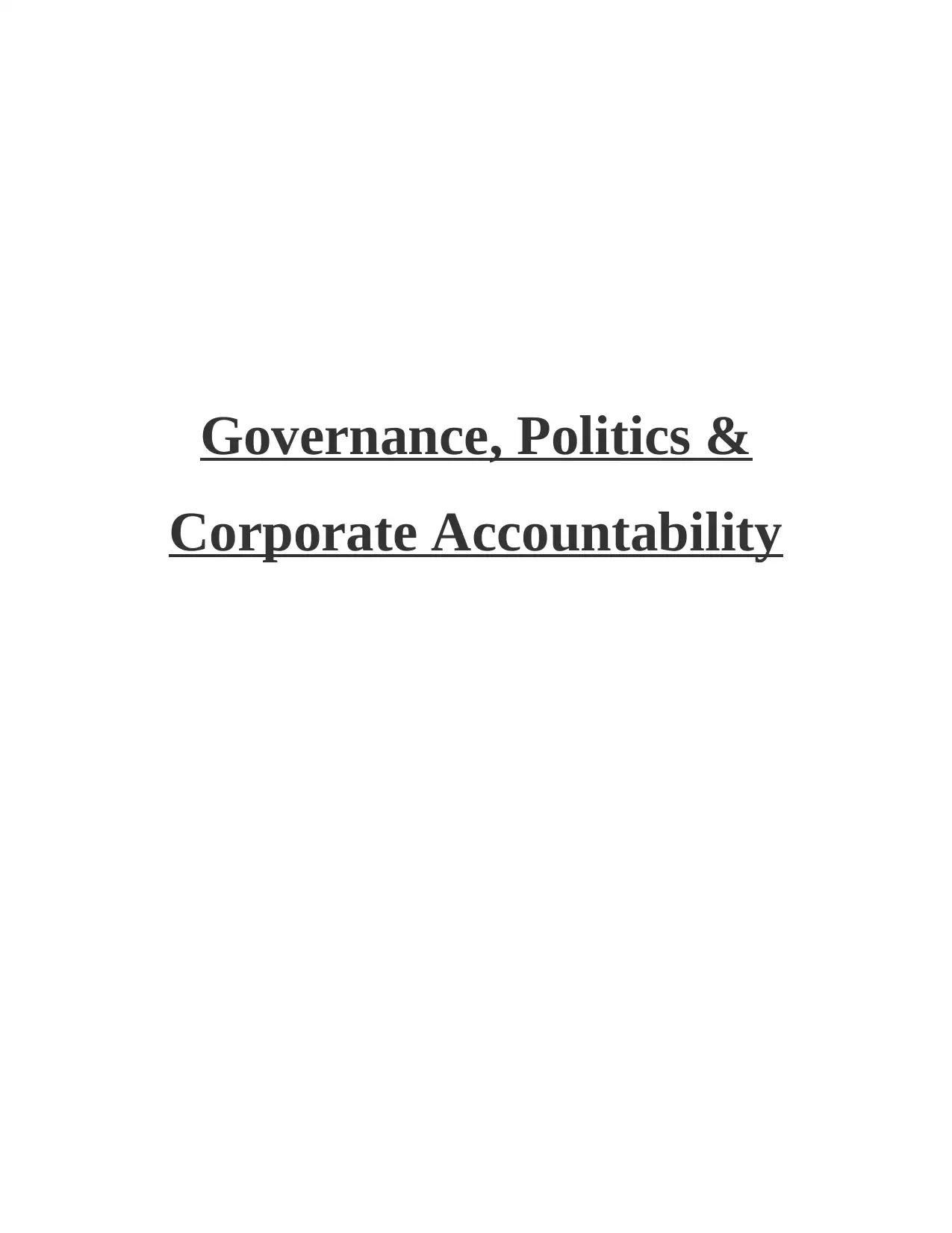
Governance, Politics &
Corporate Accountability
Corporate Accountability
Secure Best Marks with AI Grader
Need help grading? Try our AI Grader for instant feedback on your assignments.

Contents
INTRODUCTION...........................................................................................................................3
MAIN BODY...................................................................................................................................3
CONCLUSION................................................................................................................................7
REFERENCES................................................................................................................................8
INTRODUCTION...........................................................................................................................3
MAIN BODY...................................................................................................................................3
CONCLUSION................................................................................................................................7
REFERENCES................................................................................................................................8
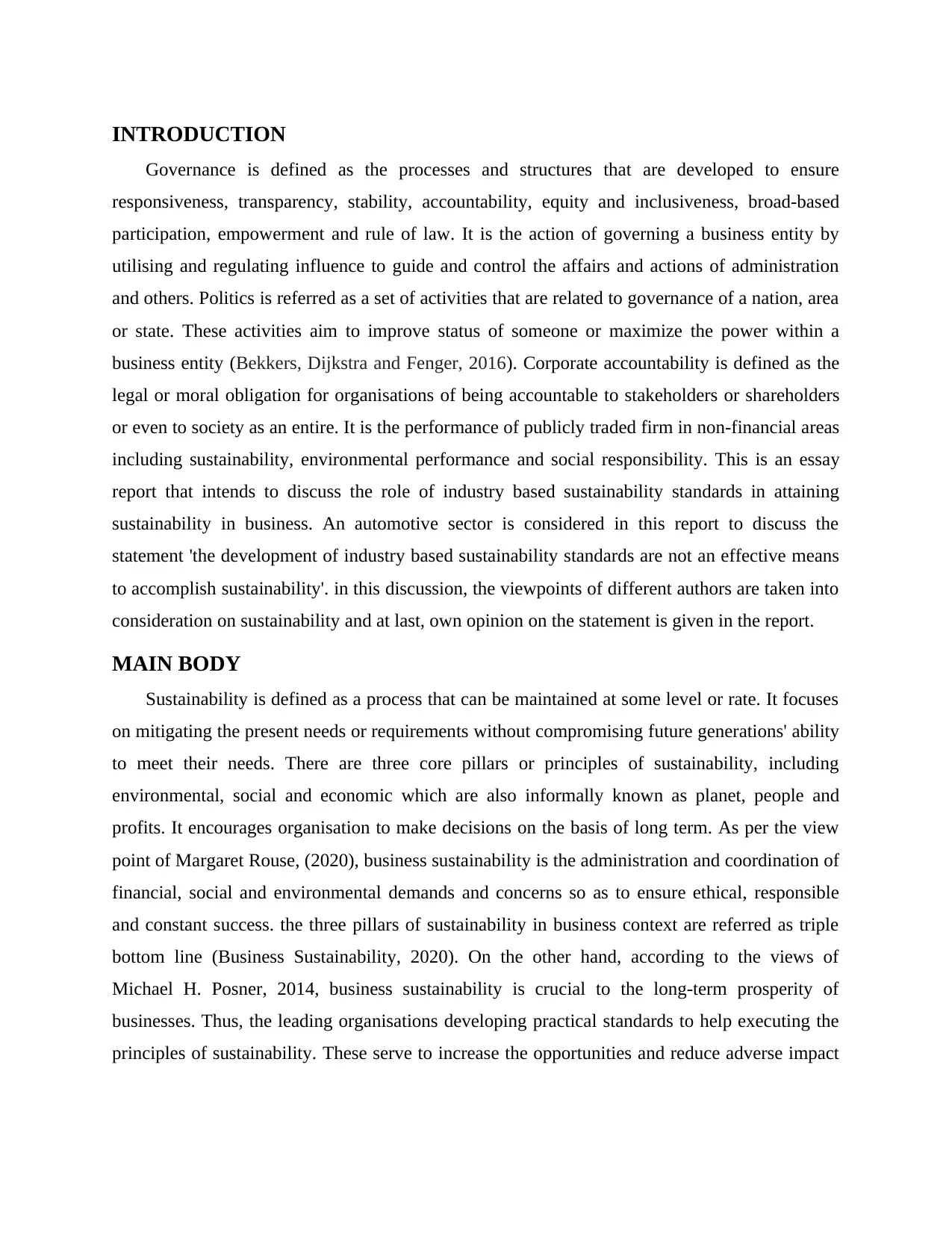
INTRODUCTION
Governance is defined as the processes and structures that are developed to ensure
responsiveness, transparency, stability, accountability, equity and inclusiveness, broad-based
participation, empowerment and rule of law. It is the action of governing a business entity by
utilising and regulating influence to guide and control the affairs and actions of administration
and others. Politics is referred as a set of activities that are related to governance of a nation, area
or state. These activities aim to improve status of someone or maximize the power within a
business entity (Bekkers, Dijkstra and Fenger, 2016). Corporate accountability is defined as the
legal or moral obligation for organisations of being accountable to stakeholders or shareholders
or even to society as an entire. It is the performance of publicly traded firm in non-financial areas
including sustainability, environmental performance and social responsibility. This is an essay
report that intends to discuss the role of industry based sustainability standards in attaining
sustainability in business. An automotive sector is considered in this report to discuss the
statement 'the development of industry based sustainability standards are not an effective means
to accomplish sustainability'. in this discussion, the viewpoints of different authors are taken into
consideration on sustainability and at last, own opinion on the statement is given in the report.
MAIN BODY
Sustainability is defined as a process that can be maintained at some level or rate. It focuses
on mitigating the present needs or requirements without compromising future generations' ability
to meet their needs. There are three core pillars or principles of sustainability, including
environmental, social and economic which are also informally known as planet, people and
profits. It encourages organisation to make decisions on the basis of long term. As per the view
point of Margaret Rouse, (2020), business sustainability is the administration and coordination of
financial, social and environmental demands and concerns so as to ensure ethical, responsible
and constant success. the three pillars of sustainability in business context are referred as triple
bottom line (Business Sustainability, 2020). On the other hand, according to the views of
Michael H. Posner, 2014, business sustainability is crucial to the long-term prosperity of
businesses. Thus, the leading organisations developing practical standards to help executing the
principles of sustainability. These serve to increase the opportunities and reduce adverse impact
Governance is defined as the processes and structures that are developed to ensure
responsiveness, transparency, stability, accountability, equity and inclusiveness, broad-based
participation, empowerment and rule of law. It is the action of governing a business entity by
utilising and regulating influence to guide and control the affairs and actions of administration
and others. Politics is referred as a set of activities that are related to governance of a nation, area
or state. These activities aim to improve status of someone or maximize the power within a
business entity (Bekkers, Dijkstra and Fenger, 2016). Corporate accountability is defined as the
legal or moral obligation for organisations of being accountable to stakeholders or shareholders
or even to society as an entire. It is the performance of publicly traded firm in non-financial areas
including sustainability, environmental performance and social responsibility. This is an essay
report that intends to discuss the role of industry based sustainability standards in attaining
sustainability in business. An automotive sector is considered in this report to discuss the
statement 'the development of industry based sustainability standards are not an effective means
to accomplish sustainability'. in this discussion, the viewpoints of different authors are taken into
consideration on sustainability and at last, own opinion on the statement is given in the report.
MAIN BODY
Sustainability is defined as a process that can be maintained at some level or rate. It focuses
on mitigating the present needs or requirements without compromising future generations' ability
to meet their needs. There are three core pillars or principles of sustainability, including
environmental, social and economic which are also informally known as planet, people and
profits. It encourages organisation to make decisions on the basis of long term. As per the view
point of Margaret Rouse, (2020), business sustainability is the administration and coordination of
financial, social and environmental demands and concerns so as to ensure ethical, responsible
and constant success. the three pillars of sustainability in business context are referred as triple
bottom line (Business Sustainability, 2020). On the other hand, according to the views of
Michael H. Posner, 2014, business sustainability is crucial to the long-term prosperity of
businesses. Thus, the leading organisations developing practical standards to help executing the
principles of sustainability. These serve to increase the opportunities and reduce adverse impact
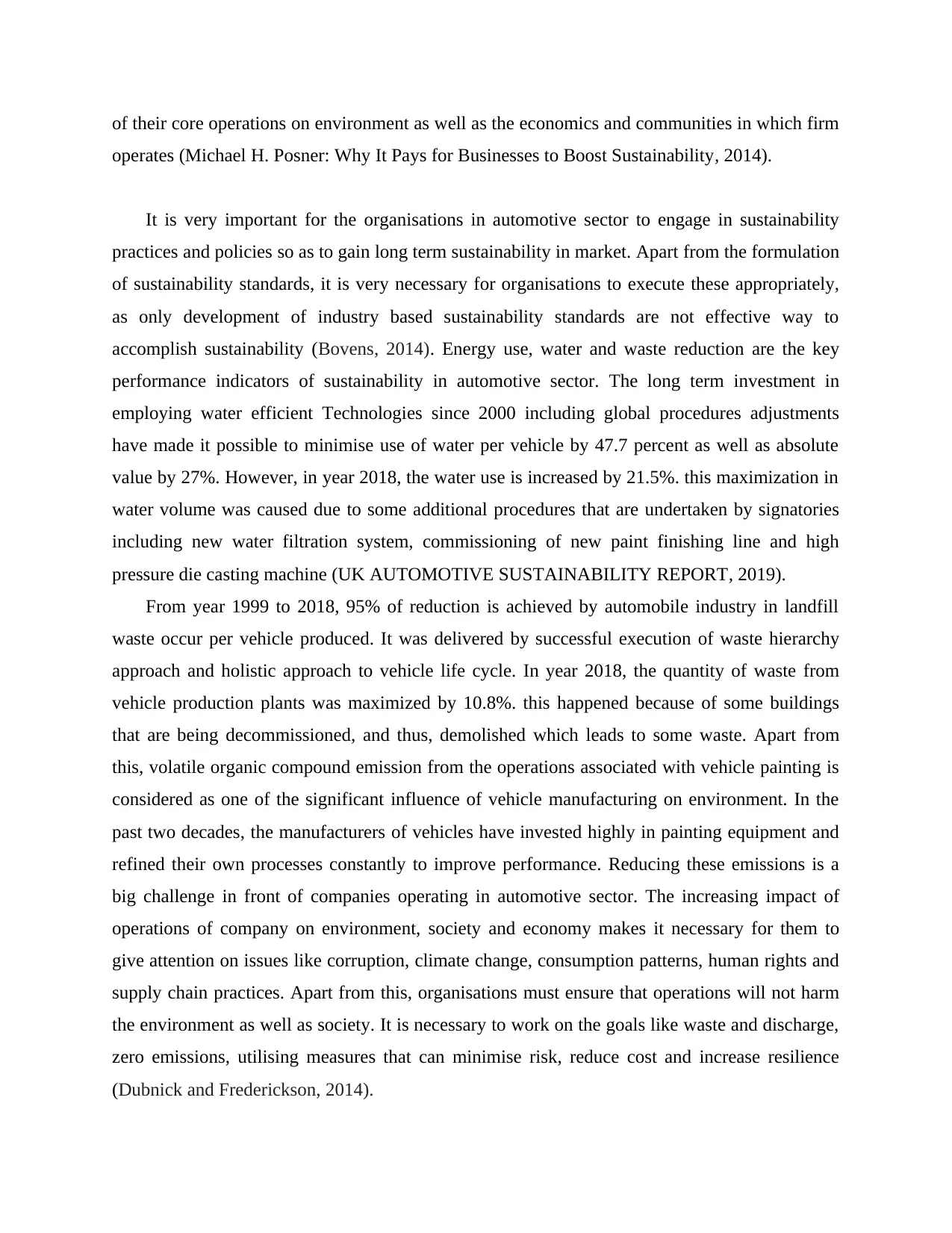
of their core operations on environment as well as the economics and communities in which firm
operates (Michael H. Posner: Why It Pays for Businesses to Boost Sustainability, 2014).
It is very important for the organisations in automotive sector to engage in sustainability
practices and policies so as to gain long term sustainability in market. Apart from the formulation
of sustainability standards, it is very necessary for organisations to execute these appropriately,
as only development of industry based sustainability standards are not effective way to
accomplish sustainability (Bovens, 2014). Energy use, water and waste reduction are the key
performance indicators of sustainability in automotive sector. The long term investment in
employing water efficient Technologies since 2000 including global procedures adjustments
have made it possible to minimise use of water per vehicle by 47.7 percent as well as absolute
value by 27%. However, in year 2018, the water use is increased by 21.5%. this maximization in
water volume was caused due to some additional procedures that are undertaken by signatories
including new water filtration system, commissioning of new paint finishing line and high
pressure die casting machine (UK AUTOMOTIVE SUSTAINABILITY REPORT, 2019).
From year 1999 to 2018, 95% of reduction is achieved by automobile industry in landfill
waste occur per vehicle produced. It was delivered by successful execution of waste hierarchy
approach and holistic approach to vehicle life cycle. In year 2018, the quantity of waste from
vehicle production plants was maximized by 10.8%. this happened because of some buildings
that are being decommissioned, and thus, demolished which leads to some waste. Apart from
this, volatile organic compound emission from the operations associated with vehicle painting is
considered as one of the significant influence of vehicle manufacturing on environment. In the
past two decades, the manufacturers of vehicles have invested highly in painting equipment and
refined their own processes constantly to improve performance. Reducing these emissions is a
big challenge in front of companies operating in automotive sector. The increasing impact of
operations of company on environment, society and economy makes it necessary for them to
give attention on issues like corruption, climate change, consumption patterns, human rights and
supply chain practices. Apart from this, organisations must ensure that operations will not harm
the environment as well as society. It is necessary to work on the goals like waste and discharge,
zero emissions, utilising measures that can minimise risk, reduce cost and increase resilience
(Dubnick and Frederickson, 2014).
operates (Michael H. Posner: Why It Pays for Businesses to Boost Sustainability, 2014).
It is very important for the organisations in automotive sector to engage in sustainability
practices and policies so as to gain long term sustainability in market. Apart from the formulation
of sustainability standards, it is very necessary for organisations to execute these appropriately,
as only development of industry based sustainability standards are not effective way to
accomplish sustainability (Bovens, 2014). Energy use, water and waste reduction are the key
performance indicators of sustainability in automotive sector. The long term investment in
employing water efficient Technologies since 2000 including global procedures adjustments
have made it possible to minimise use of water per vehicle by 47.7 percent as well as absolute
value by 27%. However, in year 2018, the water use is increased by 21.5%. this maximization in
water volume was caused due to some additional procedures that are undertaken by signatories
including new water filtration system, commissioning of new paint finishing line and high
pressure die casting machine (UK AUTOMOTIVE SUSTAINABILITY REPORT, 2019).
From year 1999 to 2018, 95% of reduction is achieved by automobile industry in landfill
waste occur per vehicle produced. It was delivered by successful execution of waste hierarchy
approach and holistic approach to vehicle life cycle. In year 2018, the quantity of waste from
vehicle production plants was maximized by 10.8%. this happened because of some buildings
that are being decommissioned, and thus, demolished which leads to some waste. Apart from
this, volatile organic compound emission from the operations associated with vehicle painting is
considered as one of the significant influence of vehicle manufacturing on environment. In the
past two decades, the manufacturers of vehicles have invested highly in painting equipment and
refined their own processes constantly to improve performance. Reducing these emissions is a
big challenge in front of companies operating in automotive sector. The increasing impact of
operations of company on environment, society and economy makes it necessary for them to
give attention on issues like corruption, climate change, consumption patterns, human rights and
supply chain practices. Apart from this, organisations must ensure that operations will not harm
the environment as well as society. It is necessary to work on the goals like waste and discharge,
zero emissions, utilising measures that can minimise risk, reduce cost and increase resilience
(Dubnick and Frederickson, 2014).
Secure Best Marks with AI Grader
Need help grading? Try our AI Grader for instant feedback on your assignments.
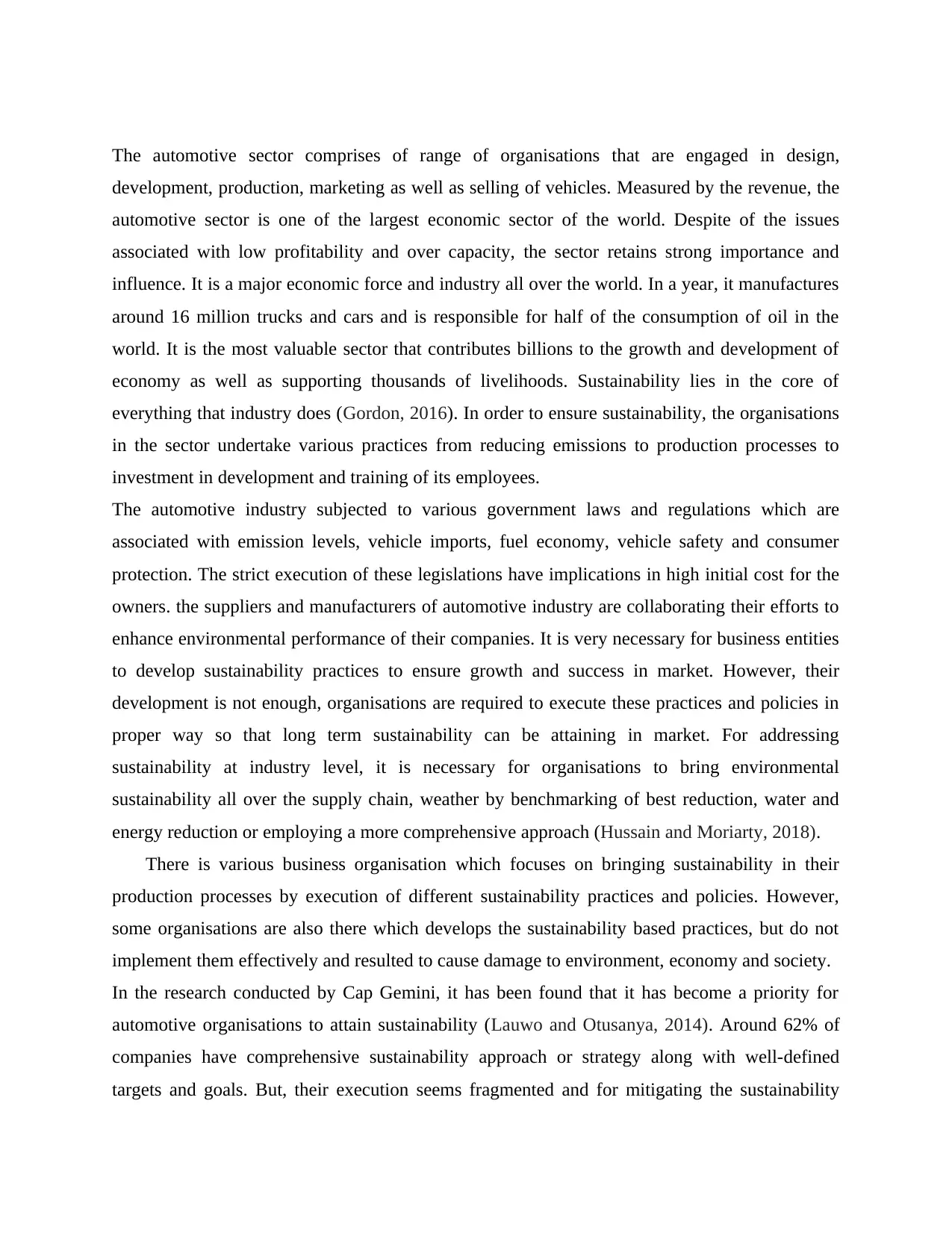
The automotive sector comprises of range of organisations that are engaged in design,
development, production, marketing as well as selling of vehicles. Measured by the revenue, the
automotive sector is one of the largest economic sector of the world. Despite of the issues
associated with low profitability and over capacity, the sector retains strong importance and
influence. It is a major economic force and industry all over the world. In a year, it manufactures
around 16 million trucks and cars and is responsible for half of the consumption of oil in the
world. It is the most valuable sector that contributes billions to the growth and development of
economy as well as supporting thousands of livelihoods. Sustainability lies in the core of
everything that industry does (Gordon, 2016). In order to ensure sustainability, the organisations
in the sector undertake various practices from reducing emissions to production processes to
investment in development and training of its employees.
The automotive industry subjected to various government laws and regulations which are
associated with emission levels, vehicle imports, fuel economy, vehicle safety and consumer
protection. The strict execution of these legislations have implications in high initial cost for the
owners. the suppliers and manufacturers of automotive industry are collaborating their efforts to
enhance environmental performance of their companies. It is very necessary for business entities
to develop sustainability practices to ensure growth and success in market. However, their
development is not enough, organisations are required to execute these practices and policies in
proper way so that long term sustainability can be attaining in market. For addressing
sustainability at industry level, it is necessary for organisations to bring environmental
sustainability all over the supply chain, weather by benchmarking of best reduction, water and
energy reduction or employing a more comprehensive approach (Hussain and Moriarty, 2018).
There is various business organisation which focuses on bringing sustainability in their
production processes by execution of different sustainability practices and policies. However,
some organisations are also there which develops the sustainability based practices, but do not
implement them effectively and resulted to cause damage to environment, economy and society.
In the research conducted by Cap Gemini, it has been found that it has become a priority for
automotive organisations to attain sustainability (Lauwo and Otusanya, 2014). Around 62% of
companies have comprehensive sustainability approach or strategy along with well-defined
targets and goals. But, their execution seems fragmented and for mitigating the sustainability
development, production, marketing as well as selling of vehicles. Measured by the revenue, the
automotive sector is one of the largest economic sector of the world. Despite of the issues
associated with low profitability and over capacity, the sector retains strong importance and
influence. It is a major economic force and industry all over the world. In a year, it manufactures
around 16 million trucks and cars and is responsible for half of the consumption of oil in the
world. It is the most valuable sector that contributes billions to the growth and development of
economy as well as supporting thousands of livelihoods. Sustainability lies in the core of
everything that industry does (Gordon, 2016). In order to ensure sustainability, the organisations
in the sector undertake various practices from reducing emissions to production processes to
investment in development and training of its employees.
The automotive industry subjected to various government laws and regulations which are
associated with emission levels, vehicle imports, fuel economy, vehicle safety and consumer
protection. The strict execution of these legislations have implications in high initial cost for the
owners. the suppliers and manufacturers of automotive industry are collaborating their efforts to
enhance environmental performance of their companies. It is very necessary for business entities
to develop sustainability practices to ensure growth and success in market. However, their
development is not enough, organisations are required to execute these practices and policies in
proper way so that long term sustainability can be attaining in market. For addressing
sustainability at industry level, it is necessary for organisations to bring environmental
sustainability all over the supply chain, weather by benchmarking of best reduction, water and
energy reduction or employing a more comprehensive approach (Hussain and Moriarty, 2018).
There is various business organisation which focuses on bringing sustainability in their
production processes by execution of different sustainability practices and policies. However,
some organisations are also there which develops the sustainability based practices, but do not
implement them effectively and resulted to cause damage to environment, economy and society.
In the research conducted by Cap Gemini, it has been found that it has become a priority for
automotive organisations to attain sustainability (Lauwo and Otusanya, 2014). Around 62% of
companies have comprehensive sustainability approach or strategy along with well-defined
targets and goals. But, their execution seems fragmented and for mitigating the sustainability
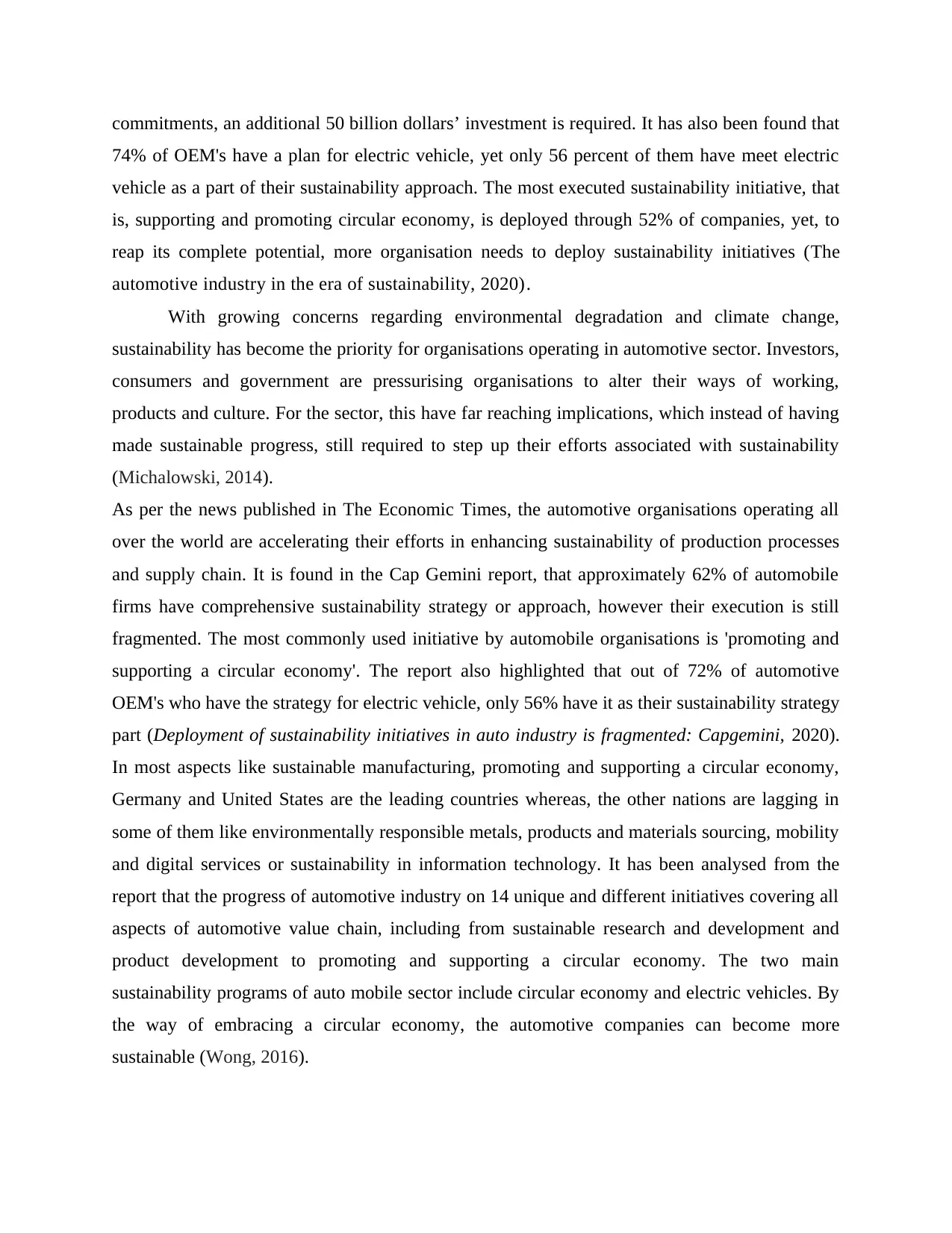
commitments, an additional 50 billion dollars’ investment is required. It has also been found that
74% of OEM's have a plan for electric vehicle, yet only 56 percent of them have meet electric
vehicle as a part of their sustainability approach. The most executed sustainability initiative, that
is, supporting and promoting circular economy, is deployed through 52% of companies, yet, to
reap its complete potential, more organisation needs to deploy sustainability initiatives (The
automotive industry in the era of sustainability, 2020).
With growing concerns regarding environmental degradation and climate change,
sustainability has become the priority for organisations operating in automotive sector. Investors,
consumers and government are pressurising organisations to alter their ways of working,
products and culture. For the sector, this have far reaching implications, which instead of having
made sustainable progress, still required to step up their efforts associated with sustainability
(Michalowski, 2014).
As per the news published in The Economic Times, the automotive organisations operating all
over the world are accelerating their efforts in enhancing sustainability of production processes
and supply chain. It is found in the Cap Gemini report, that approximately 62% of automobile
firms have comprehensive sustainability strategy or approach, however their execution is still
fragmented. The most commonly used initiative by automobile organisations is 'promoting and
supporting a circular economy'. The report also highlighted that out of 72% of automotive
OEM's who have the strategy for electric vehicle, only 56% have it as their sustainability strategy
part (Deployment of sustainability initiatives in auto industry is fragmented: Capgemini, 2020).
In most aspects like sustainable manufacturing, promoting and supporting a circular economy,
Germany and United States are the leading countries whereas, the other nations are lagging in
some of them like environmentally responsible metals, products and materials sourcing, mobility
and digital services or sustainability in information technology. It has been analysed from the
report that the progress of automotive industry on 14 unique and different initiatives covering all
aspects of automotive value chain, including from sustainable research and development and
product development to promoting and supporting a circular economy. The two main
sustainability programs of auto mobile sector include circular economy and electric vehicles. By
the way of embracing a circular economy, the automotive companies can become more
sustainable (Wong, 2016).
74% of OEM's have a plan for electric vehicle, yet only 56 percent of them have meet electric
vehicle as a part of their sustainability approach. The most executed sustainability initiative, that
is, supporting and promoting circular economy, is deployed through 52% of companies, yet, to
reap its complete potential, more organisation needs to deploy sustainability initiatives (The
automotive industry in the era of sustainability, 2020).
With growing concerns regarding environmental degradation and climate change,
sustainability has become the priority for organisations operating in automotive sector. Investors,
consumers and government are pressurising organisations to alter their ways of working,
products and culture. For the sector, this have far reaching implications, which instead of having
made sustainable progress, still required to step up their efforts associated with sustainability
(Michalowski, 2014).
As per the news published in The Economic Times, the automotive organisations operating all
over the world are accelerating their efforts in enhancing sustainability of production processes
and supply chain. It is found in the Cap Gemini report, that approximately 62% of automobile
firms have comprehensive sustainability strategy or approach, however their execution is still
fragmented. The most commonly used initiative by automobile organisations is 'promoting and
supporting a circular economy'. The report also highlighted that out of 72% of automotive
OEM's who have the strategy for electric vehicle, only 56% have it as their sustainability strategy
part (Deployment of sustainability initiatives in auto industry is fragmented: Capgemini, 2020).
In most aspects like sustainable manufacturing, promoting and supporting a circular economy,
Germany and United States are the leading countries whereas, the other nations are lagging in
some of them like environmentally responsible metals, products and materials sourcing, mobility
and digital services or sustainability in information technology. It has been analysed from the
report that the progress of automotive industry on 14 unique and different initiatives covering all
aspects of automotive value chain, including from sustainable research and development and
product development to promoting and supporting a circular economy. The two main
sustainability programs of auto mobile sector include circular economy and electric vehicles. By
the way of embracing a circular economy, the automotive companies can become more
sustainable (Wong, 2016).
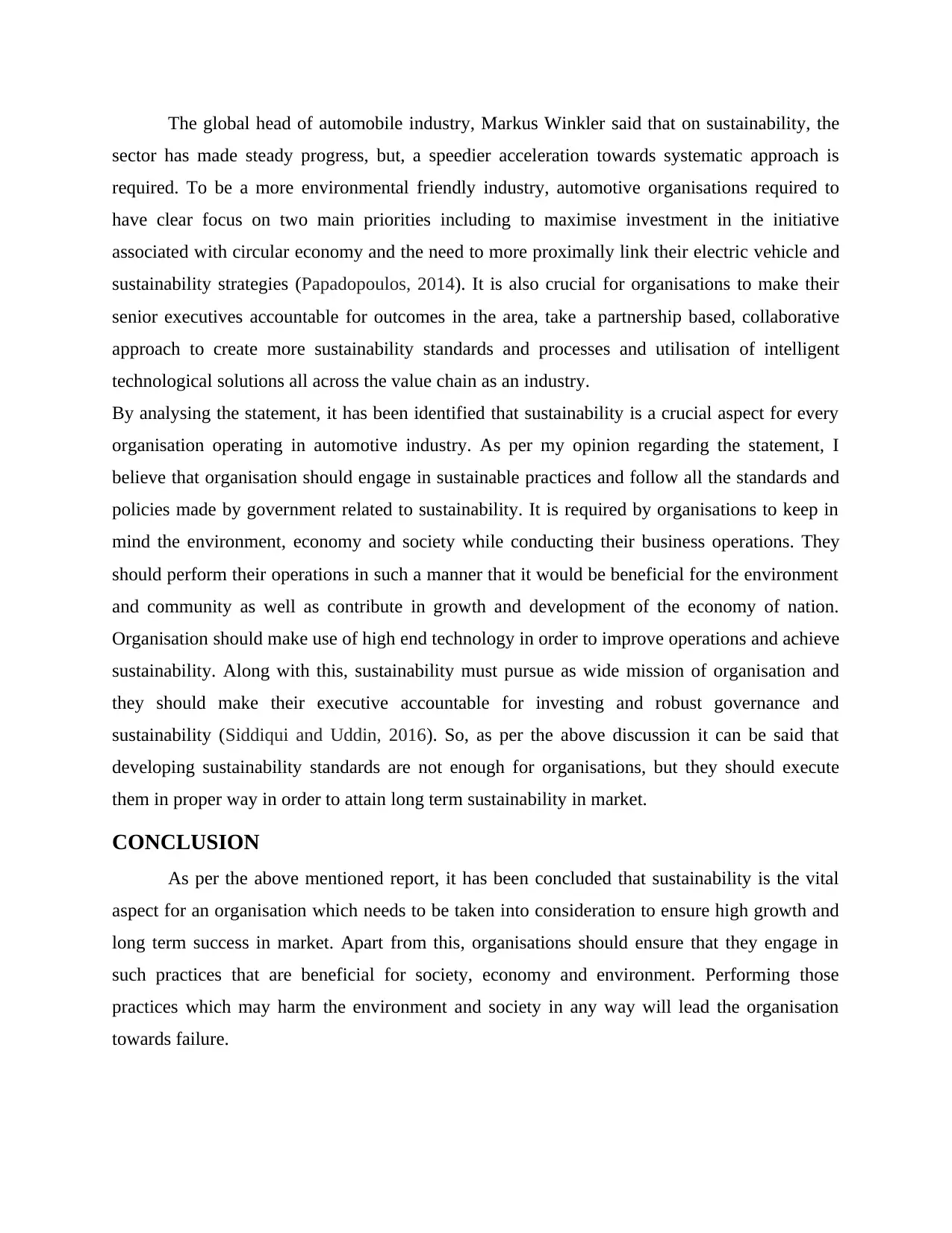
The global head of automobile industry, Markus Winkler said that on sustainability, the
sector has made steady progress, but, a speedier acceleration towards systematic approach is
required. To be a more environmental friendly industry, automotive organisations required to
have clear focus on two main priorities including to maximise investment in the initiative
associated with circular economy and the need to more proximally link their electric vehicle and
sustainability strategies (Papadopoulos, 2014). It is also crucial for organisations to make their
senior executives accountable for outcomes in the area, take a partnership based, collaborative
approach to create more sustainability standards and processes and utilisation of intelligent
technological solutions all across the value chain as an industry.
By analysing the statement, it has been identified that sustainability is a crucial aspect for every
organisation operating in automotive industry. As per my opinion regarding the statement, I
believe that organisation should engage in sustainable practices and follow all the standards and
policies made by government related to sustainability. It is required by organisations to keep in
mind the environment, economy and society while conducting their business operations. They
should perform their operations in such a manner that it would be beneficial for the environment
and community as well as contribute in growth and development of the economy of nation.
Organisation should make use of high end technology in order to improve operations and achieve
sustainability. Along with this, sustainability must pursue as wide mission of organisation and
they should make their executive accountable for investing and robust governance and
sustainability (Siddiqui and Uddin, 2016). So, as per the above discussion it can be said that
developing sustainability standards are not enough for organisations, but they should execute
them in proper way in order to attain long term sustainability in market.
CONCLUSION
As per the above mentioned report, it has been concluded that sustainability is the vital
aspect for an organisation which needs to be taken into consideration to ensure high growth and
long term success in market. Apart from this, organisations should ensure that they engage in
such practices that are beneficial for society, economy and environment. Performing those
practices which may harm the environment and society in any way will lead the organisation
towards failure.
sector has made steady progress, but, a speedier acceleration towards systematic approach is
required. To be a more environmental friendly industry, automotive organisations required to
have clear focus on two main priorities including to maximise investment in the initiative
associated with circular economy and the need to more proximally link their electric vehicle and
sustainability strategies (Papadopoulos, 2014). It is also crucial for organisations to make their
senior executives accountable for outcomes in the area, take a partnership based, collaborative
approach to create more sustainability standards and processes and utilisation of intelligent
technological solutions all across the value chain as an industry.
By analysing the statement, it has been identified that sustainability is a crucial aspect for every
organisation operating in automotive industry. As per my opinion regarding the statement, I
believe that organisation should engage in sustainable practices and follow all the standards and
policies made by government related to sustainability. It is required by organisations to keep in
mind the environment, economy and society while conducting their business operations. They
should perform their operations in such a manner that it would be beneficial for the environment
and community as well as contribute in growth and development of the economy of nation.
Organisation should make use of high end technology in order to improve operations and achieve
sustainability. Along with this, sustainability must pursue as wide mission of organisation and
they should make their executive accountable for investing and robust governance and
sustainability (Siddiqui and Uddin, 2016). So, as per the above discussion it can be said that
developing sustainability standards are not enough for organisations, but they should execute
them in proper way in order to attain long term sustainability in market.
CONCLUSION
As per the above mentioned report, it has been concluded that sustainability is the vital
aspect for an organisation which needs to be taken into consideration to ensure high growth and
long term success in market. Apart from this, organisations should ensure that they engage in
such practices that are beneficial for society, economy and environment. Performing those
practices which may harm the environment and society in any way will lead the organisation
towards failure.
Paraphrase This Document
Need a fresh take? Get an instant paraphrase of this document with our AI Paraphraser

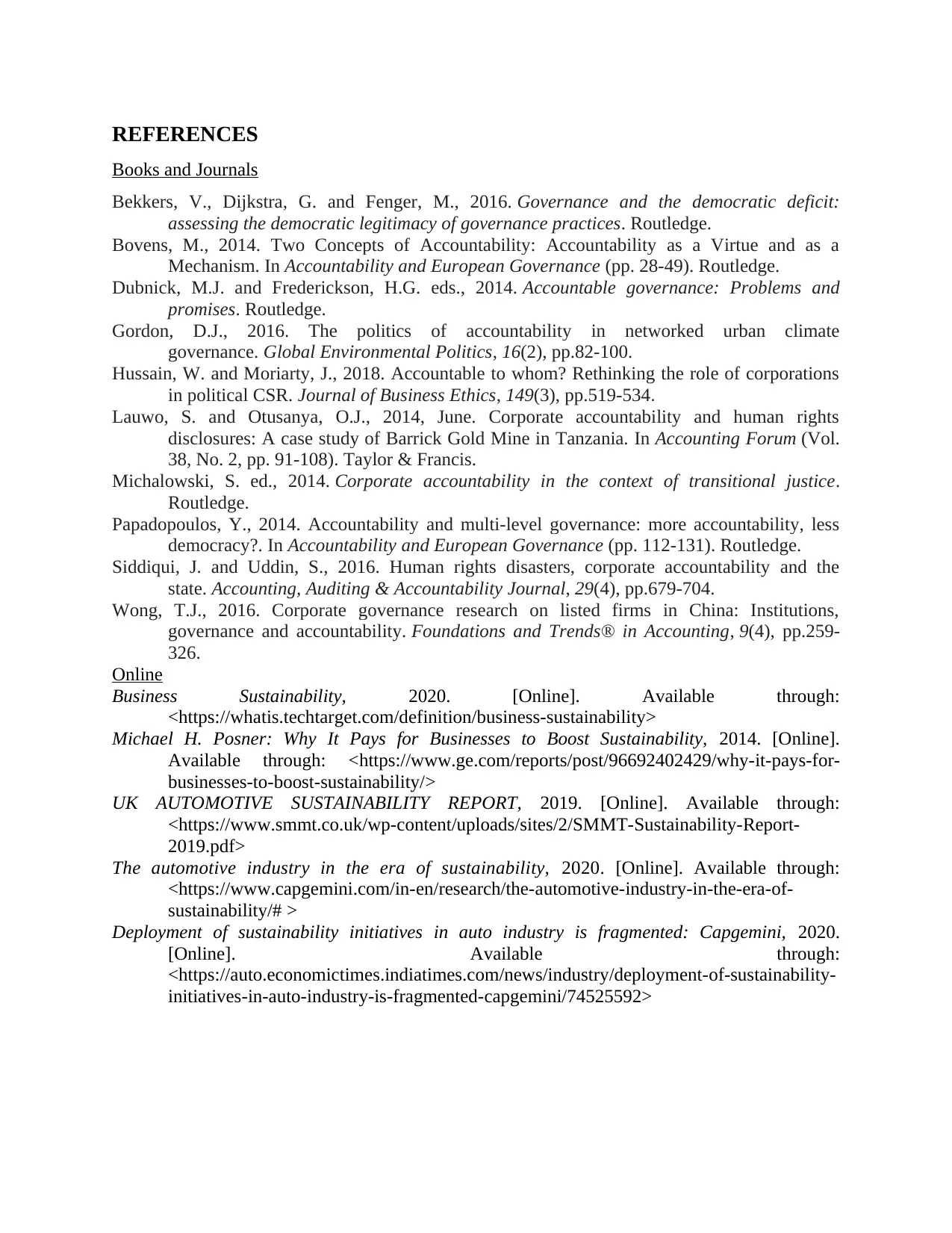
REFERENCES
Books and Journals
Bekkers, V., Dijkstra, G. and Fenger, M., 2016. Governance and the democratic deficit:
assessing the democratic legitimacy of governance practices. Routledge.
Bovens, M., 2014. Two Concepts of Accountability: Accountability as a Virtue and as a
Mechanism. In Accountability and European Governance (pp. 28-49). Routledge.
Dubnick, M.J. and Frederickson, H.G. eds., 2014. Accountable governance: Problems and
promises. Routledge.
Gordon, D.J., 2016. The politics of accountability in networked urban climate
governance. Global Environmental Politics, 16(2), pp.82-100.
Hussain, W. and Moriarty, J., 2018. Accountable to whom? Rethinking the role of corporations
in political CSR. Journal of Business Ethics, 149(3), pp.519-534.
Lauwo, S. and Otusanya, O.J., 2014, June. Corporate accountability and human rights
disclosures: A case study of Barrick Gold Mine in Tanzania. In Accounting Forum (Vol.
38, No. 2, pp. 91-108). Taylor & Francis.
Michalowski, S. ed., 2014. Corporate accountability in the context of transitional justice.
Routledge.
Papadopoulos, Y., 2014. Accountability and multi-level governance: more accountability, less
democracy?. In Accountability and European Governance (pp. 112-131). Routledge.
Siddiqui, J. and Uddin, S., 2016. Human rights disasters, corporate accountability and the
state. Accounting, Auditing & Accountability Journal, 29(4), pp.679-704.
Wong, T.J., 2016. Corporate governance research on listed firms in China: Institutions,
governance and accountability. Foundations and Trends® in Accounting, 9(4), pp.259-
326.
Online
Business Sustainability, 2020. [Online]. Available through:
<https://whatis.techtarget.com/definition/business-sustainability>
Michael H. Posner: Why It Pays for Businesses to Boost Sustainability, 2014. [Online].
Available through: <https://www.ge.com/reports/post/96692402429/why-it-pays-for-
businesses-to-boost-sustainability/>
UK AUTOMOTIVE SUSTAINABILITY REPORT, 2019. [Online]. Available through:
<https://www.smmt.co.uk/wp-content/uploads/sites/2/SMMT-Sustainability-Report-
2019.pdf>
The automotive industry in the era of sustainability, 2020. [Online]. Available through:
<https://www.capgemini.com/in-en/research/the-automotive-industry-in-the-era-of-
sustainability/# >
Deployment of sustainability initiatives in auto industry is fragmented: Capgemini, 2020.
[Online]. Available through:
<https://auto.economictimes.indiatimes.com/news/industry/deployment-of-sustainability-
initiatives-in-auto-industry-is-fragmented-capgemini/74525592>
Books and Journals
Bekkers, V., Dijkstra, G. and Fenger, M., 2016. Governance and the democratic deficit:
assessing the democratic legitimacy of governance practices. Routledge.
Bovens, M., 2014. Two Concepts of Accountability: Accountability as a Virtue and as a
Mechanism. In Accountability and European Governance (pp. 28-49). Routledge.
Dubnick, M.J. and Frederickson, H.G. eds., 2014. Accountable governance: Problems and
promises. Routledge.
Gordon, D.J., 2016. The politics of accountability in networked urban climate
governance. Global Environmental Politics, 16(2), pp.82-100.
Hussain, W. and Moriarty, J., 2018. Accountable to whom? Rethinking the role of corporations
in political CSR. Journal of Business Ethics, 149(3), pp.519-534.
Lauwo, S. and Otusanya, O.J., 2014, June. Corporate accountability and human rights
disclosures: A case study of Barrick Gold Mine in Tanzania. In Accounting Forum (Vol.
38, No. 2, pp. 91-108). Taylor & Francis.
Michalowski, S. ed., 2014. Corporate accountability in the context of transitional justice.
Routledge.
Papadopoulos, Y., 2014. Accountability and multi-level governance: more accountability, less
democracy?. In Accountability and European Governance (pp. 112-131). Routledge.
Siddiqui, J. and Uddin, S., 2016. Human rights disasters, corporate accountability and the
state. Accounting, Auditing & Accountability Journal, 29(4), pp.679-704.
Wong, T.J., 2016. Corporate governance research on listed firms in China: Institutions,
governance and accountability. Foundations and Trends® in Accounting, 9(4), pp.259-
326.
Online
Business Sustainability, 2020. [Online]. Available through:
<https://whatis.techtarget.com/definition/business-sustainability>
Michael H. Posner: Why It Pays for Businesses to Boost Sustainability, 2014. [Online].
Available through: <https://www.ge.com/reports/post/96692402429/why-it-pays-for-
businesses-to-boost-sustainability/>
UK AUTOMOTIVE SUSTAINABILITY REPORT, 2019. [Online]. Available through:
<https://www.smmt.co.uk/wp-content/uploads/sites/2/SMMT-Sustainability-Report-
2019.pdf>
The automotive industry in the era of sustainability, 2020. [Online]. Available through:
<https://www.capgemini.com/in-en/research/the-automotive-industry-in-the-era-of-
sustainability/# >
Deployment of sustainability initiatives in auto industry is fragmented: Capgemini, 2020.
[Online]. Available through:
<https://auto.economictimes.indiatimes.com/news/industry/deployment-of-sustainability-
initiatives-in-auto-industry-is-fragmented-capgemini/74525592>
1 out of 9
Related Documents
Your All-in-One AI-Powered Toolkit for Academic Success.
+13062052269
info@desklib.com
Available 24*7 on WhatsApp / Email
![[object Object]](/_next/static/media/star-bottom.7253800d.svg)
Unlock your academic potential
© 2024 | Zucol Services PVT LTD | All rights reserved.




